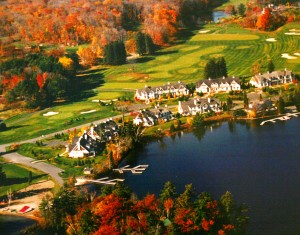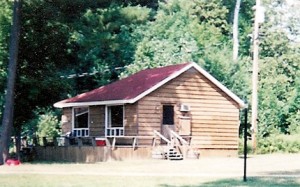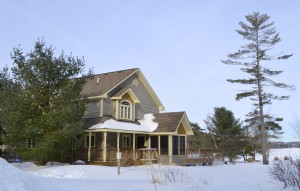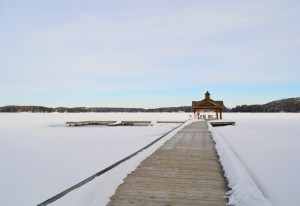In the early 1990s, Club Link Corporation, a golf club and hotel company, bought Elgin House, a resort which stood across the lake from Pinelands Resort. It wasted no time tearing the old resort down and building the Lake Joseph Club, a condominium style resort and golf course, and set its sights on Pinelands next.

Aerial view of the Lake Joseph Club, one of the first condominium developments in Muskoka.
Photo courtesy of Alf Mortimer
By 1998, Bruce Reville and his family, who had resisted Club Link’s offer to buy for several years, finally sold the Pinelands property, though they leased it back for several years and continued to run the resort.
But Reville knew it wouldn’t be long until Pinelands was gone.
“You could see the changes in Muskoka. We knew something was going to happen,” he says.
Indeed, the 1980s and 1990s saw a surge of condominiums built in Muskoka, a response to consumer demand with which Reville says he had been fighting to keep up. But as a family-run operation, Pinelands just didn’t have the cash to keep up with the new form of lodging in Muskoka.
Developer Walter Prychidny bought the Pinelands property from Club Link in 2002. He ran the hotel as it was for a couple years, but says it was never his intention to preserve the historic resort.
“The vision was to acquire the real estate and keep it in a holding pattern and determine whether it made sense to redevelop,” he says. “It didn’t make any money. The resort was obsolete.”
According to Prychidny, this was largely because of the greater trend that resorts in Muskoka were too expensive for what people were getting.
“You’re in Haliburton at Wigama or you’re at Pinelands in Muskoka, and all of a sudden your families are going to Disney World for the same cost or less, or Dominican or Cuba,” says Prychidny. “All of a sudden that whole little marketplace is in your face and it’s cheaper for families to go away.”
To Reville, this was not something new.
“You could see the changes in Muskoka… We knew something was going to happen.”
“People used to stand at our front desk and say I could go to Mexico or the Caribbean for cheaper and I’d say I know. We go there. We go there in the winter and we can’t believe it,” he says.
“For a family of four, it would be four or five thousand dollars and they could probably do it for half that (price). That was always tough. You’re always trying to add more value for them to stay here. They’re not guaranteed the weather. Down south you’re more guaranteed. You’re fighting that. Before, when you talk to the old hoteliers, their clients just had to get out of the city, drive north to somewhere cooler. Now you can go to Dominican and everything is air conditioned.”

A typical cabin at Pinelands before the resort was redeveloped as the Muskokan Resort Club. According to developer Walter Prychidny, the resort was “obsolete.”
Photo courtesy of Judy Embleton
Reville says the high costs of wages, food, and liquor made it difficult to be competitive, not to mention the short summer season.
Prychidny agrees, noting that Muskoka resorts can’t afford to cut costs to undercut these discount southern holidays.
“It’s a high operating cost, high utility bills and high overhead,” he says. “It’s a seasonal operation.”
Prychidny notes that as property values—and thus property taxes—have increased in Muskoka, especially on big lakeshore properties, it has become near impossible for resorts to be successful anymore.
“None of the resorts are really making substantial money on a cash flow basis, not like it was in the past,” he says.
And Prychidny says it’s really only developers looking to operate fractional ownership models who can afford to buy resort properties now. The fractional model, where people buy a “fraction” of the year at a resort so during their fraction it’s as if it’s their own cottage, unloads the burden from owners and developers because the onus is no longer on them to pay all maintenance fees and property taxes.
“Muskoka’s just a market niche where it’s too big for a general manager of a hotel looking to buy a property,” Prychidny says.
It’s something Reville knows all too well. He says he can see why resort commercial property owners find this type of model appealing.
“That (traditional model) of ownership, where people are buying and paying the maintenance fees as a single owner, owing the land and the buildings and paying the upgrades, it was just getting too costly,” he says. “It made more sense with the condominium or the fractional or the timeshare.”
“It’s a high operating cost, high utility bills and high overhead… It’s a seasonal operation.”
Prychidny tore down the Pinelands hotel and built the Muskokan Resort Club, a series of cottages that each have their own deck, barbeque, and screened-in porch: a “Muskoka Room.” He says not only is this easier for him as a resort developer, but it’s more in line with what people want.
“The consumer demand has changed,” he says. “At Pinelands, our hotel rooms were 400 square feet. (People) don’t want that anymore. They want their own space. They want the cottage feel, the cottage life.”

A typical cottage at the Muskokan during the wintertime. Each home has its own screened-in porch, deck, and barbecue to allow for privacy and the true “cottage feel.”
Photo by Erin Morawetz
Ownership models became the new norm in the late 1990s into the 2000s. The main hotel of the Red Leaves development, now owned by Canadian Niagara Hotels and run as The Rosseau, a JW Marriott hotel, began as a condominium hotel development. Other resorts, including Windermere, have expanded to include an ownership model along with their traditional hotel. In fact, at least eight resorts in Muskoka have been converted in some way to include a fractional ownership component, albeit all slightly different, decreasing the number of rooms available to the free and travelling public.
Some people have embraced the fractional model, like Barb Mann, a longtime Muskoka cottager. She and her husband became interested in the Muskokan when they were looking to get a piece of property as an investment.
“It was something we thought was a wise investment opportunity,” she says. “We started going around to see what all these developments were. We were very impressed when we saw the Muskokan.”
Mann and her husband bought a fraction at the Muskokan, which means they get five weeks out of the year. The catch? Of the five weeks, four have to be in different seasons: one each in Spring, Summer, Fall and Winter, with a floating holiday week, meaning it changes each year and can land on Thanksgiving, Christmas, or March Break.
For Mann, this works out well.
“We love (the Muskokan) for the off season because our cottage is really a cottage,” she says. “It takes forever to warm up and the plumbing (in the winter) is always an issue, so we really enjoy the opportunity to be up here in the colder times of the year.”
Mann and her husband have consistently put their summer week into the “rental pool” at the Muskokan, a necessary element for a property such as the Muskokan to still be considered resort commercial, and as such, open to the free and travelling public.
But while the fractional model works for some, it has its drawbacks.
When Prychidny was building the first phase of fractional cottages at the Muskokan, the first people he pitched them to were former Pinelands regulars. Two families did indeed buy fractions, but Embleton wasn’t one of them. For her, the idea of spending over $100,000 and only having one week in the summer was not good value—and just not something she wanted.

Unlike Pinelands, the Muskokan is open all year round. Good news for developer Prychidny is it’s not his responsibility to make sure people come in the cold weather.
Photo by Erin Morawetz
“The last year we were there, they tried to pitch us the condo,” she says. “But you only get to come for several weeks, one in each season, and you can’t lock in a second week in the summer if you want.”
And for Embleton, who always enjoyed the interaction with other vacationing families at Pinelands, the loss of the traditional-style resort was devastating.
“When I heard Pinelands was sold, my heart sank,” she says. “I knew what it meant.”
But for Prychidny, another benefit of the fractional ownership model is that it’s not his responsibility to encourage people to come to Muskoka in the off seasons, something that has become an issue for resorts which are keeping their doors open in the winter, trying to generate more capital.
“They’re owners so it’s up to them,” he says of the people who own fractions at the Muskokan. “They could come and use it or not, it’s not up to me to get them there.”
While the Muskokan has had success, other similar developments have run into problems selling their units. The Red Leaves development in Minett, marketed to became a four-season community resort similar to developments in Collingwood and Whistler, went into receivership less than a year after opening, having sold very few of its condo units. Canadian Niagara Hotels, which bought the hotel portion of Red Leaves and is running it as The Rosseau, a JW Marriott hotel, has abandoned the ownership model and is finding success as a traditional hotel. Touchstone Resort, another fractional ownership development, appears to have stopped its planned expansion of fractional units for the time being.
Muskoka real estate agent Brian McElwain says the real problem with fractional ownership units is they do not hold their value in resale, and average 30 to 45 per cent lower resale prices than their original price. And even at that rate, McElwain says, they are not selling. In fact, there were only two fractional units resold in all of Muskoka last year.
Anne McCauley, a land use planner, says a lot of the lack of resale has to do with the fact that in a fractional ownership agreement, owners are not required to maintain the property. In addition, many of those who buy these units do so through a line of credit, as it is not possible to get a mortgage on a fractionally-owned property.
“You don’t have real property,” she explains. “You have a unit you can use, but you own it with many other people. Banks can’t determine the mortgage risk of all the other people you’re sharing with.”
And for many people, owning a condominium or a fraction of time at a resort development is not the Muskoka experience they want—or can afford.
For Embleton, the loss of traditional resorts in Muskoka means the lakes are becoming less and less accessible for middle-income families. While some resorts, like Shamrock Lodge, still offer all-inclusive packages, they are few and far between. Embleton says she has spent time at The Rosseau and loved it, but it’s not a place she can afford to spend a week’s holiday, as she used to at Pinelands.
“It’s pay as you go,” she explains. “We go for one or two nights and that pretty much breaks the bank.”
And at the end of the day, what is more important—spending time by the lake with family, or having a luxury condominium? In the past, people may have said the former. But now, the tranquility of the lakes and the rocks and the trees just doesn’t seem like enough.